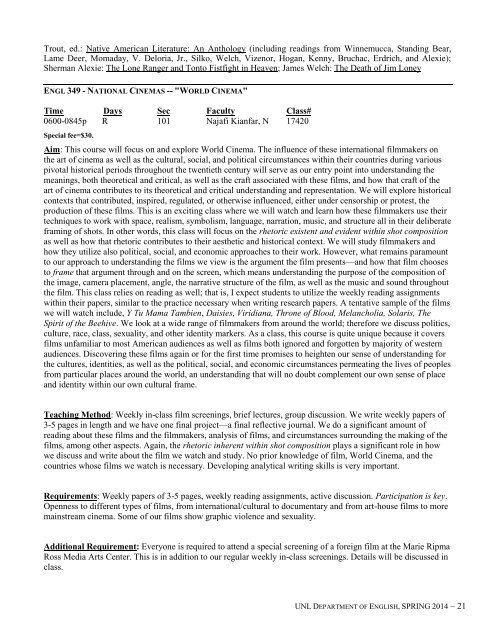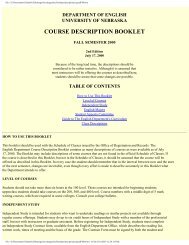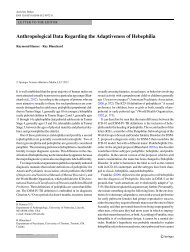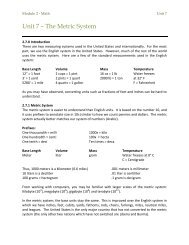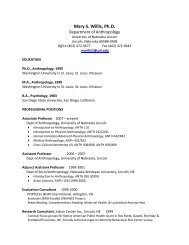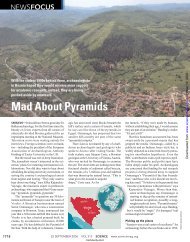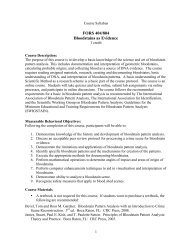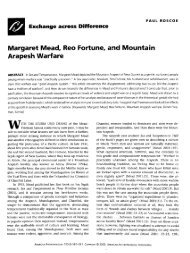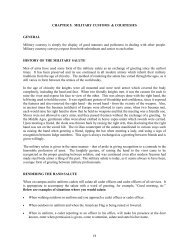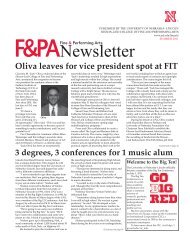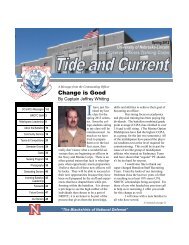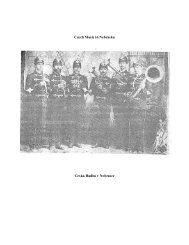COURSE DESCRIPTION BOOKLET Undergraduate Level Courses
COURSE DESCRIPTION BOOKLET Undergraduate Level Courses
COURSE DESCRIPTION BOOKLET Undergraduate Level Courses
Create successful ePaper yourself
Turn your PDF publications into a flip-book with our unique Google optimized e-Paper software.
Trout, ed.: Native American Literature: An Anthology (including readings from Winnemucca, Standing Bear,<br />
Lame Deer, Momaday, V. Deloria, Jr., Silko, Welch, Vizenor, Hogan, Kenny, Bruchac, Erdrich, and Alexie);<br />
Sherman Alexie: The Lone Ranger and Tonto Fistfight in Heaven; James Welch: The Death of Jim Loney<br />
ENGL 349 - NATIONAL CINEMAS -- "WORLD CINEMA"<br />
Time Days Sec Faculty Class#<br />
0600-0845p R 101 Najafi Kianfar, N 17420<br />
Special fee=$30.<br />
Aim: This course will focus on and explore World Cinema. The influence of these international filmmakers on<br />
the art of cinema as well as the cultural, social, and political circumstances within their countries during various<br />
pivotal historical periods throughout the twentieth century will serve as our entry point into understanding the<br />
meanings, both theoretical and critical, as well as the craft associated with these films, and how that craft of the<br />
art of cinema contributes to its theoretical and critical understanding and representation. We will explore historical<br />
contexts that contributed, inspired, regulated, or otherwise influenced, either under censorship or protest, the<br />
production of these films. This is an exciting class where we will watch and learn how these filmmakers use their<br />
techniques to work with space, realism, symbolism, language, narration, music, and structure all in their deliberate<br />
framing of shots. In other words, this class will focus on the rhetoric existent and evident within shot composition<br />
as well as how that rhetoric contributes to their aesthetic and historical context. We will study filmmakers and<br />
how they utilize also political, social, and economic approaches to their work. However, what remains paramount<br />
to our approach to understanding the films we view is the argument the film presents—and how that film chooses<br />
to frame that argument through and on the screen, which means understanding the purpose of the composition of<br />
the image, camera placement, angle, the narrative structure of the film, as well as the music and sound throughout<br />
the film. This class relies on reading as well; that is, I expect students to utilize the weekly reading assignments<br />
within their papers, similar to the practice necessary when writing research papers. A tentative sample of the films<br />
we will watch include, Y Tu Mama Tambien, Daisies, Viridiana, Throne of Blood, Melancholia, Solaris, The<br />
Spirit of the Beehive. We look at a wide range of filmmakers from around the world; therefore we discuss politics,<br />
culture, race, class, sexuality, and other identity markers. As a class, this course is quite unique because it covers<br />
films unfamiliar to most American audiences as well as films both ignored and forgotten by majority of western<br />
audiences. Discovering these films again or for the first time promises to heighten our sense of understanding for<br />
the cultures, identities, as well as the political, social, and economic circumstances permeating the lives of peoples<br />
from particular places around the world, an understanding that will no doubt complement our own sense of place<br />
and identity within our own cultural frame.<br />
Teaching Method: Weekly in-class film screenings, brief lectures, group discussion. We write weekly papers of<br />
3-5 pages in length and we have one final project—a final reflective journal. We do a significant amount of<br />
reading about these films and the filmmakers, analysis of films, and circumstances surrounding the making of the<br />
films, among other aspects. Again, the rhetoric inherent within shot composition plays a significant role in how<br />
we discuss and write about the film we watch and study. No prior knowledge of film, World Cinema, and the<br />
countries whose films we watch is necessary. Developing analytical writing skills is very important.<br />
Requirements: Weekly papers of 3-5 pages, weekly reading assignments, active discussion. Participation is key.<br />
Openness to different types of films, from international/cultural to documentary and from art-house films to more<br />
mainstream cinema. Some of our films show graphic violence and sexuality.<br />
Additional Requirement: Everyone is required to attend a special screening of a foreign film at the Marie Ripma<br />
Ross Media Arts Center. This is in addition to our regular weekly in-class screenings. Details will be discussed in<br />
class.<br />
UNL DEPARTMENT OF ENGLISH, SPRING 2014 – 21


